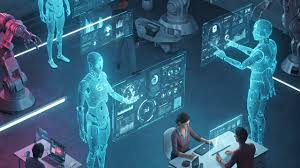
Artificial Intelligence agents are systems designed to autonomously perform tasks based on input, decision-making logic, and feedback mechanisms. Unlike simple scripts or static automation, these agents can learn, adapt, and optimize performance through exposure to data and outcomes. Examples include virtual assistants like Siri or Alexa, automated trading bots, recommendation engines, and even generative AI tools capable of writing, coding, or creating art.
These systems leverage machine learning, natural language processing, computer vision, and other subfields of AI to simulate human capabilities. Their potential to take on repetitive or even cognitive-intensive jobs has sparked intense debate over how they will influence employment across skill levels.
Redefining Human Roles
One of the most immediate impacts of AI agents is the redefinition of roles. Tasks that were once the domain of entry-level workers—like scheduling, answering queries, or processing documents—are increasingly handled by AI. While this might raise alarms about job losses, the shift is often more nuanced.
In many workplaces, AI agents are being used to augment rather than replace. For instance, in the healthcare sector, AI can analyze diagnostic images faster than radiologists, but it still requires expert human interpretation and oversight. In journalism, AI can generate financial reports or sports summaries, allowing writers to focus on deeper, investigative stories.
As machines take over routine elements, humans are required to develop and emphasize skills such as creativity, critical thinking, emotional intelligence, and strategic decision-making—areas where machines still lag behind.
Job Displacement vs. Job Creation
Much of the anxiety surrounding AI relates to job displacement. Sectors like manufacturing, transportation, retail, and customer service are particularly susceptible. Self-checkout systems, autonomous vehicles, and robotic process automation are already making inroads into the labor force. According to studies by McKinsey and the World Economic Forum, millions of jobs could be automated in the next decade.
However, this is only half the story. As with previous industrial revolutions, new roles are emerging. For every factory worker replaced by a robot, there is increasing demand for robot maintenance technicians, data scientists, algorithm trainers, and AI ethicists. The key difference now is the speed of change, which requires workers to adapt more rapidly than ever before.
The emergence of entirely new categories of employment—such as prompt engineers, AI trainers, or digital identity managers—reflects the evolving landscape. These jobs may not exist in traditional training programs, underscoring the importance of agile learning and lifelong education.
Impact on Different Skill Levels
AI agents are affecting both low-skill and high-skill jobs. In the past, automation primarily impacted manual labor. Today, AI is moving up the value chain, encroaching on tasks performed by professionals such as accountants, lawyers, and even software developers. Language models can generate legal drafts, identify tax anomalies, and suggest programming solutions—tasks once reserved for highly trained experts.
On the flip side, not all jobs are equally vulnerable. Roles involving human interaction, empathy, physical dexterity, and nuanced judgment are still relatively resistant to full automation. For instance, teachers, therapists, chefs, and caregivers require a level of human touch and context that AI cannot yet replicate.
The Gig Economy and AI Collaboration
The rise of platform-based work and the gig economy has also evolved under AI’s influence. Ride-sharing platforms, food delivery apps, and freelance marketplaces are driven by algorithms matching supply and demand in real time. While these platforms offer flexibility and access to income, they also raise concerns around worker rights, job stability, and algorithmic bias.
Interestingly, many gig workers now use AI themselves. Freelancers leverage AI tools for writing, graphic design, video editing, and more. This symbiosis creates a new kind of digital labor—humans working with machines, not against them.
Education and Workforce Adaptation
The education system must respond to the shifting job landscape. Traditional curricula focusing on rote memorization and predefined tasks may no longer serve future workers well. Instead, there’s a growing emphasis on interdisciplinary learning, digital fluency, and soft skills.
Vocational training programs are evolving to include AI literacy, data interpretation, and systems thinking. Initiatives by governments and corporations to reskill workers are critical, but the onus also lies on individuals to embrace lifelong learning. The ability to adapt, learn new tools, and think critically about technology will be key to thriving in the age of AI.
Ethical Considerations and Regulation
With AI agents performing sensitive roles in hiring, policing, and healthcare, questions of fairness, bias, and accountability become paramount. Who is responsible when an AI-driven system makes a harmful or biased decision? How can we ensure transparency in algorithms that affect livelihoods?
Governments and institutions must craft ethical frameworks and regulatory standards to govern the deployment of AI in workspaces. In parallel, AI designers and companies must build systems with explainability, fairness, and inclusivity at their core.
The Psychological and Social Impact
Beyond economics, the rise of AI in the workplace influences our sense of purpose and identity. For many, work is more than just income—it’s a source of pride, community, and meaning. As roles evolve or disappear, society must reconsider how to support mental well-being and social cohesion.
Some futurists suggest decoupling income from employment through measures like universal basic income or job-sharing models. Others advocate for redefining success and productivity beyond traditional job metrics, especially in a world where AI handles much of the output.
Looking Ahead
The future of work will not be defined solely by AI agents, but by how humanity chooses to integrate them. If approached thoughtfully, AI can relieve humans from drudgery and unlock new realms of creativity and collaboration. But if handled irresponsibly, it may exacerbate inequality and alienate vast segments of the workforce.
As AI continues to progress, adaptability, empathy, and ethical foresight will be essential. Societies that invest in inclusive technological development, prioritize education, and create safety nets for displaced workers are more likely to thrive in this new era.
Ultimately, the story of AI and employment is still being written. Whether it becomes a tale of displacement or empowerment depends on the choices we make today.